Deck 13: Limits: a Preview of Calculus
Question
Question
Question
Question
Question
Question
Question
Question
Question
Question
Question
Question
Question
Question
Question
Question
Question
Question
Question
Question
Question
Question
Question
Question
Question
Question
Question
Question
Question
Question
Question
Question
Question
Question
Question
Question
Question
Question
Question
Question
Question
Question
Question
Question
Question
Question
Question
Question
Question
Question
Question
Question
Question
Question
Question
Question
Question
Question
Question
Question
Question
Question
Question
Question
Question
Question

Unlock Deck
Sign up to unlock the cards in this deck!
Unlock Deck
Unlock Deck
1/66
Play
Full screen (f)
Deck 13: Limits: a Preview of Calculus
1
Use a table of values to estimate the value of  . Use a graphing device to confirm your answer graphically.
. Use a graphing device to confirm your answer graphically.
 . Use a graphing device to confirm your answer graphically.
. Use a graphing device to confirm your answer graphically.It appears that  .
. 
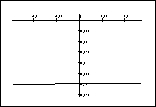
 .
. 

2
Evaluate  , and justify each step by indicating the appropriate Limit Law(s).
, and justify each step by indicating the appropriate Limit Law(s).
 , and justify each step by indicating the appropriate Limit Law(s).
, and justify each step by indicating the appropriate Limit Law(s).
3
Evaluate the limit if it exists. 


4
Evaluate  .
.
 .
.
Unlock Deck
Unlock for access to all 66 flashcards in this deck.
Unlock Deck
k this deck
5
For the function g whose graph is given, state the value of the given quantity if it exists. 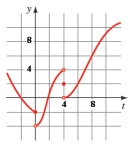
a)
b)
c)

a)

b)

c)


Unlock Deck
Unlock for access to all 66 flashcards in this deck.
Unlock Deck
k this deck
6
Evaluate  .
.
 .
.
Unlock Deck
Unlock for access to all 66 flashcards in this deck.
Unlock Deck
k this deck
7
Evaluate  , and justify each step by indicating the appropriate Limit Law(s).
, and justify each step by indicating the appropriate Limit Law(s).
 , and justify each step by indicating the appropriate Limit Law(s).
, and justify each step by indicating the appropriate Limit Law(s).
Unlock Deck
Unlock for access to all 66 flashcards in this deck.
Unlock Deck
k this deck
8
For the function g whose graph is given, state the value of the given quantity if it exists. 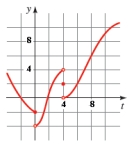
a)
b)
c)

a)

b)

c)


Unlock Deck
Unlock for access to all 66 flashcards in this deck.
Unlock Deck
k this deck
9
For the function  whose graph is given, state the value of the given quantity.
whose graph is given, state the value of the given quantity.
A)
B)
C)
D)
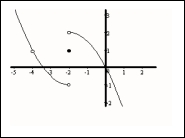
 whose graph is given, state the value of the given quantity.
whose graph is given, state the value of the given quantity.A)

B)

C)

D)



Unlock Deck
Unlock for access to all 66 flashcards in this deck.
Unlock Deck
k this deck
10
Use a graphing device to determine whether  exists. If the limit exists, estimate its value to two decimal places.
exists. If the limit exists, estimate its value to two decimal places.
 exists. If the limit exists, estimate its value to two decimal places.
exists. If the limit exists, estimate its value to two decimal places.
Unlock Deck
Unlock for access to all 66 flashcards in this deck.
Unlock Deck
k this deck
11
Complete the table of values (to five decimal places) and use the table to estimate the value of  .
. 
 .
. 

Unlock Deck
Unlock for access to all 66 flashcards in this deck.
Unlock Deck
k this deck
12
Evaluate the limit if it exists. 


Unlock Deck
Unlock for access to all 66 flashcards in this deck.
Unlock Deck
k this deck
13
Evaluate  .
.
 .
.
Unlock Deck
Unlock for access to all 66 flashcards in this deck.
Unlock Deck
k this deck
14
Evaluate  .
.
 .
.
Unlock Deck
Unlock for access to all 66 flashcards in this deck.
Unlock Deck
k this deck
15
Evaluate the limit if it exists. 


Unlock Deck
Unlock for access to all 66 flashcards in this deck.
Unlock Deck
k this deck
16
Evaluate  .
.
 .
.
Unlock Deck
Unlock for access to all 66 flashcards in this deck.
Unlock Deck
k this deck
17
Use a table of values to estimate the value of  . Use a graphing device to confirm your answer.
. Use a graphing device to confirm your answer.
 . Use a graphing device to confirm your answer.
. Use a graphing device to confirm your answer.
Unlock Deck
Unlock for access to all 66 flashcards in this deck.
Unlock Deck
k this deck
18
For the function g whose graph is given, state the value of the given quantity if it exists.
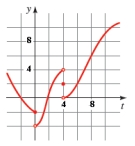
a)
b)

a)

b)


Unlock Deck
Unlock for access to all 66 flashcards in this deck.
Unlock Deck
k this deck
19
Use a table of values to estimate the value of  . Use a graphing device to confirm your answer graphically.
. Use a graphing device to confirm your answer graphically.
 . Use a graphing device to confirm your answer graphically.
. Use a graphing device to confirm your answer graphically.
Unlock Deck
Unlock for access to all 66 flashcards in this deck.
Unlock Deck
k this deck
20
Evaluate the limit if it exists. 


Unlock Deck
Unlock for access to all 66 flashcards in this deck.
Unlock Deck
k this deck
21
Find the value of  , if it exists. If the limit does not exist, explain why.
, if it exists. If the limit does not exist, explain why.
 , if it exists. If the limit does not exist, explain why.
, if it exists. If the limit does not exist, explain why.
Unlock Deck
Unlock for access to all 66 flashcards in this deck.
Unlock Deck
k this deck
22
Find the derivative of the function at the given number.  at 4
at 4
 at 4
at 4
Unlock Deck
Unlock for access to all 66 flashcards in this deck.
Unlock Deck
k this deck
23
Find the derivative of the function at the given number.  at 2
at 2
 at 2
at 2
Unlock Deck
Unlock for access to all 66 flashcards in this deck.
Unlock Deck
k this deck
24
Find the derivative of  at the point
at the point  .
.
 at the point
at the point  .
.
Unlock Deck
Unlock for access to all 66 flashcards in this deck.
Unlock Deck
k this deck
25
Find the derivative of the function at the given number.  at 4
at 4
 at 4
at 4
Unlock Deck
Unlock for access to all 66 flashcards in this deck.
Unlock Deck
k this deck
26
Find  , where a is in the domain of f.
, where a is in the domain of f. 
 , where a is in the domain of f.
, where a is in the domain of f. 

Unlock Deck
Unlock for access to all 66 flashcards in this deck.
Unlock Deck
k this deck
27
Find the slope of the tangent line of the graph of  at the point
at the point  .
.
 at the point
at the point  .
.
Unlock Deck
Unlock for access to all 66 flashcards in this deck.
Unlock Deck
k this deck
28
Find the derivative of  at the point
at the point  .
.
 at the point
at the point  .
.
Unlock Deck
Unlock for access to all 66 flashcards in this deck.
Unlock Deck
k this deck
29
If  , find
, find  .
.
 , find
, find  .
.
Unlock Deck
Unlock for access to all 66 flashcards in this deck.
Unlock Deck
k this deck
30
Find the slope of the tangent line of the graph of  at the point
at the point  .
.
 at the point
at the point  .
.
Unlock Deck
Unlock for access to all 66 flashcards in this deck.
Unlock Deck
k this deck
31
Find the value of  , if it exists. If the limit does not exist, explain why.
, if it exists. If the limit does not exist, explain why.
 , if it exists. If the limit does not exist, explain why.
, if it exists. If the limit does not exist, explain why.
Unlock Deck
Unlock for access to all 66 flashcards in this deck.
Unlock Deck
k this deck
32
If  , find
, find  .
.
 , find
, find  .
.
Unlock Deck
Unlock for access to all 66 flashcards in this deck.
Unlock Deck
k this deck
33
Find the derivative of the function at the given number.  at 1
at 1
 at 1
at 1
Unlock Deck
Unlock for access to all 66 flashcards in this deck.
Unlock Deck
k this deck
34
Find the equation of the tangent line to the curve 
 at the point
at the point  .
.

 at the point
at the point  .
.
Unlock Deck
Unlock for access to all 66 flashcards in this deck.
Unlock Deck
k this deck
35
Find the equation of the tangent line to the curve 
 at the point
at the point  .
.

 at the point
at the point  .
.
Unlock Deck
Unlock for access to all 66 flashcards in this deck.
Unlock Deck
k this deck
36
Find the derivative of the function at the given number.  at 1
at 1
 at 1
at 1
Unlock Deck
Unlock for access to all 66 flashcards in this deck.
Unlock Deck
k this deck
37
Find the value of  , if it exists. If the limit does not exist, explain why.
, if it exists. If the limit does not exist, explain why.
 , if it exists. If the limit does not exist, explain why.
, if it exists. If the limit does not exist, explain why.
Unlock Deck
Unlock for access to all 66 flashcards in this deck.
Unlock Deck
k this deck
38
Find the derivative of the function at the given number.  at 2
at 2
 at 2
at 2
Unlock Deck
Unlock for access to all 66 flashcards in this deck.
Unlock Deck
k this deck
39
Find the slope of the tangent line of the graph of  at the point
at the point  .
.
 at the point
at the point  .
.
Unlock Deck
Unlock for access to all 66 flashcards in this deck.
Unlock Deck
k this deck
40
Find the derivative of  at the point
at the point  .
.
 at the point
at the point  .
.
Unlock Deck
Unlock for access to all 66 flashcards in this deck.
Unlock Deck
k this deck
41
Estimate the area under the graph of  from
from  to
to  using
using
(a) four approximating rectangles and right endpoints.
(b) four approximating rectangles and left endpoints.
(c) eight approximating rectangles and right endpoints.
 from
from  to
to  using
using (a) four approximating rectangles and right endpoints.
(b) four approximating rectangles and left endpoints.
(c) eight approximating rectangles and right endpoints.

Unlock Deck
Unlock for access to all 66 flashcards in this deck.
Unlock Deck
k this deck
42
Use a table of values to estimate the value of  . Then use a graphing device to confirm your result graphically.
. Then use a graphing device to confirm your result graphically.
 . Then use a graphing device to confirm your result graphically.
. Then use a graphing device to confirm your result graphically.
Unlock Deck
Unlock for access to all 66 flashcards in this deck.
Unlock Deck
k this deck
43
Determine whether the sequence  converges or diverges. If it converges, find the limit.
converges or diverges. If it converges, find the limit.
 converges or diverges. If it converges, find the limit.
converges or diverges. If it converges, find the limit.
Unlock Deck
Unlock for access to all 66 flashcards in this deck.
Unlock Deck
k this deck
44
Find  .
.
 .
.
Unlock Deck
Unlock for access to all 66 flashcards in this deck.
Unlock Deck
k this deck
45
Use a table of values to estimate the value of  . Then use a graphing device to confirm your result graphically.
. Then use a graphing device to confirm your result graphically.
 . Then use a graphing device to confirm your result graphically.
. Then use a graphing device to confirm your result graphically.
Unlock Deck
Unlock for access to all 66 flashcards in this deck.
Unlock Deck
k this deck
46
Determine whether the sequence  converges or diverges. If it converges, find the limit.
converges or diverges. If it converges, find the limit.
 converges or diverges. If it converges, find the limit.
converges or diverges. If it converges, find the limit.
Unlock Deck
Unlock for access to all 66 flashcards in this deck.
Unlock Deck
k this deck
47
Determine whether the sequence  converges or diverges. If it converges, find the limit.
converges or diverges. If it converges, find the limit.
 converges or diverges. If it converges, find the limit.
converges or diverges. If it converges, find the limit.
Unlock Deck
Unlock for access to all 66 flashcards in this deck.
Unlock Deck
k this deck
48
Determine whether the sequence  converges or diverges. If it converges, find the limit.
converges or diverges. If it converges, find the limit.
 converges or diverges. If it converges, find the limit.
converges or diverges. If it converges, find the limit.
Unlock Deck
Unlock for access to all 66 flashcards in this deck.
Unlock Deck
k this deck
49
Determine whether the sequence  converges or diverges. If it converges, find the limit.
converges or diverges. If it converges, find the limit.
 converges or diverges. If it converges, find the limit.
converges or diverges. If it converges, find the limit.
Unlock Deck
Unlock for access to all 66 flashcards in this deck.
Unlock Deck
k this deck
50
A particle moves in a straight line with its displacement of motion described by equation  , where
, where  is measured in feet and
is measured in feet and  is measured in seconds. Find the velocity of
is measured in seconds. Find the velocity of  at
at  ,
,  ,
,  , and
, and  .
.
 , where
, where  is measured in feet and
is measured in feet and  is measured in seconds. Find the velocity of
is measured in seconds. Find the velocity of  at
at  ,
,  ,
,  , and
, and  .
.
Unlock Deck
Unlock for access to all 66 flashcards in this deck.
Unlock Deck
k this deck
51
Find  .
.
 .
.
Unlock Deck
Unlock for access to all 66 flashcards in this deck.
Unlock Deck
k this deck
52
Find  .
.
 .
.
Unlock Deck
Unlock for access to all 66 flashcards in this deck.
Unlock Deck
k this deck
53
Use a table of values to estimate the value of  . Then use a graphing device to confirm your result graphically.
. Then use a graphing device to confirm your result graphically.
 . Then use a graphing device to confirm your result graphically.
. Then use a graphing device to confirm your result graphically.
Unlock Deck
Unlock for access to all 66 flashcards in this deck.
Unlock Deck
k this deck
54
Estimate the area under the graph of  from
from  to
to  using
using
(a) four approximating rectangles and right endpoints.
(b) four approximating rectangles and left endpoints.
(c) eight approximating rectangles and right endpoints.
 from
from  to
to  using
using (a) four approximating rectangles and right endpoints.
(b) four approximating rectangles and left endpoints.
(c) eight approximating rectangles and right endpoints.

Unlock Deck
Unlock for access to all 66 flashcards in this deck.
Unlock Deck
k this deck
55
Determine whether the sequence  converges or diverges. If it converges, find the limit.
converges or diverges. If it converges, find the limit.
 converges or diverges. If it converges, find the limit.
converges or diverges. If it converges, find the limit.
Unlock Deck
Unlock for access to all 66 flashcards in this deck.
Unlock Deck
k this deck
56
Estimate the area under the graph of  from
from  to
to  using
using
(a) four approximating rectangles and right endpoints.
(b) four approximating rectangles and left endpoints.
(c) eight approximating rectangles and right endpoints.
 from
from  to
to  using
using (a) four approximating rectangles and right endpoints.
(b) four approximating rectangles and left endpoints.
(c) eight approximating rectangles and right endpoints.

Unlock Deck
Unlock for access to all 66 flashcards in this deck.
Unlock Deck
k this deck
57
Use a table of values to estimate the value of  . Then use a graphing device to confirm your result graphically.
. Then use a graphing device to confirm your result graphically.
 . Then use a graphing device to confirm your result graphically.
. Then use a graphing device to confirm your result graphically.
Unlock Deck
Unlock for access to all 66 flashcards in this deck.
Unlock Deck
k this deck
58
Determine whether the sequence  converges or diverges. If it converges, find the limit.
converges or diverges. If it converges, find the limit.
 converges or diverges. If it converges, find the limit.
converges or diverges. If it converges, find the limit.
Unlock Deck
Unlock for access to all 66 flashcards in this deck.
Unlock Deck
k this deck
59
Use the definition of area as a limit to find the area of the region that lies under the graph of  over the interval
over the interval  .
.
 over the interval
over the interval  .
.
Unlock Deck
Unlock for access to all 66 flashcards in this deck.
Unlock Deck
k this deck
60
A stone is dropped into a pond causing a circular ripple in the water. Find the rate of change of the area  of the circle with respect to the radius when
of the circle with respect to the radius when  ft.
ft.
 of the circle with respect to the radius when
of the circle with respect to the radius when  ft.
ft.
Unlock Deck
Unlock for access to all 66 flashcards in this deck.
Unlock Deck
k this deck
61
Use the definition of area as a limit to find the area of the region that lies under the graph of  over the interval
over the interval  .
.
 over the interval
over the interval  .
.
Unlock Deck
Unlock for access to all 66 flashcards in this deck.
Unlock Deck
k this deck
62
Use the definition of area as a limit to find the area of the region that lies under the graph of  over the interval
over the interval  .
.
 over the interval
over the interval  .
.
Unlock Deck
Unlock for access to all 66 flashcards in this deck.
Unlock Deck
k this deck
63
Use the definition of area as a limit to find the area of the region that lies under the graph of  over the interval
over the interval  .
.
 over the interval
over the interval  .
.
Unlock Deck
Unlock for access to all 66 flashcards in this deck.
Unlock Deck
k this deck
64
Use the definition of area as a limit to find the area of the region that lies under the graph of  over the interval
over the interval  .
.
 over the interval
over the interval  .
.
Unlock Deck
Unlock for access to all 66 flashcards in this deck.
Unlock Deck
k this deck
65
Use the definition of area as a limit to find the area of the region that lies under the graph of  over the interval
over the interval  .
.
 over the interval
over the interval  .
.
Unlock Deck
Unlock for access to all 66 flashcards in this deck.
Unlock Deck
k this deck
66
Use the definition of area as a limit to find the area of the region that lies under the graph of  over the interval
over the interval  .
.
 over the interval
over the interval  .
.
Unlock Deck
Unlock for access to all 66 flashcards in this deck.
Unlock Deck
k this deck


